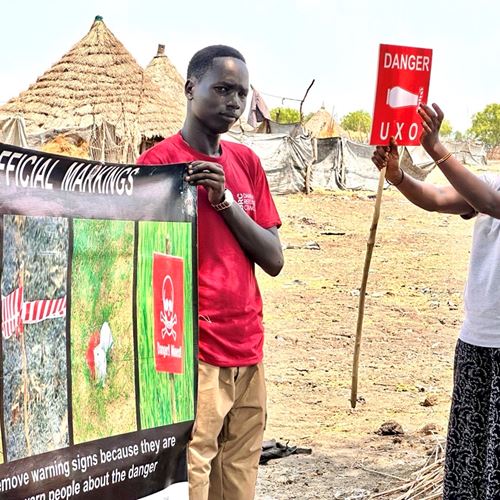News
Land Mines in Akobo County, South Sudan: A Looming Threat to Lives and Livelihoods
Akobo County in South Sudan bears the enduring scars of conflict, with landmines representing a deadly threat to its residents. These remnants of past conflicts have plagued the area for decades, claiming lives and causing devastating injuries.

Despite ongoing efforts to clear these dangerous devices, the specter of landmines continues to cast a shadow over the community, necessitating urgent action. The impact of landmines in Akobo County has been profound, affecting both lives and livelihoods.
The indiscriminate nature of these weapons has resulted in tragic loss of life and limb, with innocent civilians, including children, often falling victim to their destructive power. Furthermore, the presence of landmines has severely impacted the local economy, particularly in agricultural and grazing areas where farmers and cattle herders are unable to freely cultivate and graze on their land for fear of triggering a deadly explosion.
In 2021, Denkjok Payam in Akobo County was confronted with the harsh reality of unexploded remnants of war buried underground, as two young girls lost their lives and others were injured while engaging in routine activities such as burning grass. This tragic incident, coupled with reports of cattle being maimed or killed by landmines in grazing areas, continues to heighten fear and uncertainty within the community.
In 2023, the community of Denkgjok discovered a number of landmines. In an effort to protect the community, some community members put themselves at extreme risks and endeavored to remove the landmines.
In response, the Administrator of Denkjok, Ruach Kai, asked for assistance from DRC who deployed a Humanitarian and Disarmament team to the area. With support from DANIDA and the German Federal Foreign Office, the team is currently conducting surveys, extracting hidden explosives and providing Explosive Ordnance Risk Education to raise awareness among the community about the dangers of landmines.

Our community is living in fear every day due to unexploded ordnances. The number we have collected is high, yet there are still more hidden. We are afraid to farm, fish and take our cattle for grazing. Some of the landmines were found in the water by fishermen during fishing. The level of awareness in this community is still little. I am glad that the DRC team is here to extract the explosives and educate the community.
/ Ruach Kai, Denkjok Payam Administrator
DRC has been at the forefront of conducting humanitarian mine action in South Sudan since 2006 through its Humanitarian Disarmament and Peacebuilding (HDP) team. The primary objective of the DRC's HDP team is to reduce the impact of landmines and unexploded ordnance (UXO) across the country, covering an estimated 16 million square meters of contaminated land in 2023.
A key aspect of the DRC's approach is the deployment of technical coordinators who specialize in applying a conflict sensitivity lens to their operations. This approach ensures that the broader context of conflict dynamics and potential impacts on local communities are taken into account when planning and implementing mine action activities.
By doing so, DRC aims to minimize any unintended negative consequences and contribute to peacebuilding efforts among affected communities.
Furthermore, the DRC works with partners, playing a crucial role in building capacity, organizing conflict sensitivity and management training for them. This ensures that all stakeholders involved in mine action are equipped with the necessary skills and knowledge to address the complexities of conflict situations effectively.
Additionally, DRC supports durable solutions for affected communities, aiming to clear contaminated land and facilitate the return and reintegration of displaced populations through the local authorities.
Despite these efforts, much more needs to be done to fully address the issue of landmines in Akobo County and its surrounding areas. Greater support from the international community is needed to fund demining operations and provide assistance to victims of landmine accidents.
Efforts to raise awareness about the dangers of landmines must also be intensified to ensure that residents are equipped with the knowledge they need to stay safe.
Through its comprehensive approach, DRC is identifying pathways for sustainable solutions to the challenges posed by landmines and small arms. By working closely with local communities, government authorities, and other humanitarian actors, DRC is making a significant impact in reducing the threat of landmines and contributing to peacebuilding efforts in South Sudan.
<
08 Apr 2024
Driving Positive Change through Sustainable Initiatives
>
04 Apr 2024
From Struggle to Strength: The inspiring story of Farhiya M…

